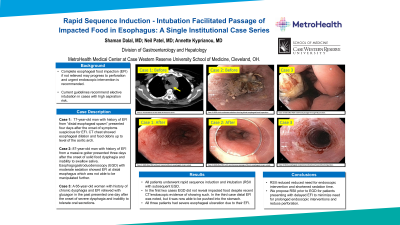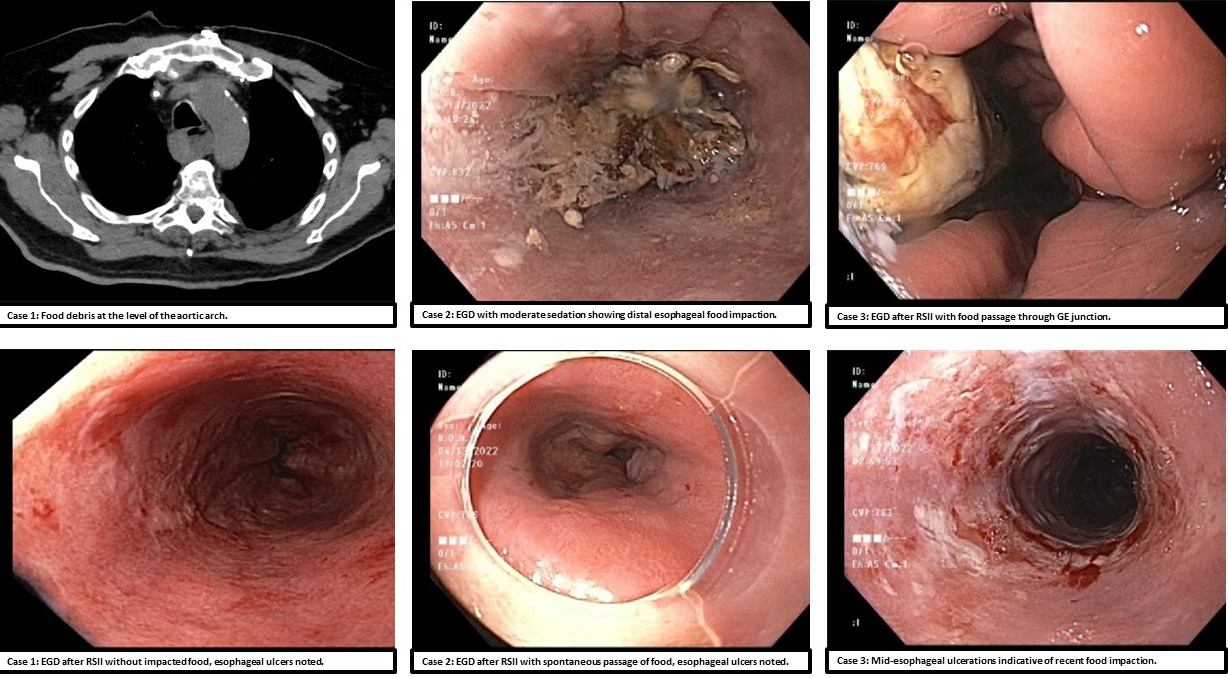Back


Poster Session D - Tuesday Morning
Category: Esophagus
D0253 - Rapid Sequence Induction-Intubation Facilitated Passage of Impacted Food in Esophagus: A Single Institutional Case Series
Tuesday, October 25, 2022
10:00 AM – 12:00 PM ET
Location: Crown Ballroom

Has Audio

Shaman Dalal, MD
The MetroHealth System
Cleveland, OH
Presenting Author(s)
Shaman Dalal, MD, Neil Patel, MD, Annette Kyprianou, MD
The MetroHealth System, Cleveland, OH
Introduction: Complete esophageal food impaction (EFI) if not relieved may progress to perforation. Existing literature does not support use of pharmacologic interventions alone and urgent endoscopic intervention is recommended to relieve the obstruction. We present a case-series of three EFI resolved without any endoscopic interventions after rapid sequence induction-intubation (RSII).
Case Description/Methods: Case 1: A 77-year-old man with history of EFI from “distal esophageal spasm” presented four days after the onset of symptoms suspicious for EFI. CT chest showed esophageal dilation and food debris up to level of the aortic arch.
Case 2: An 87-year-old man with history of EFI from a massive goiter presented three days after the onset of solid food dysphagia and inability to swallow saliva. Esophagogastroduodenoscopy (EGD) with moderate sedation showed EFI at distal esophagus which was not able to be manipulated further.
Case 3: A 65-year-old woman with history of chronic dysphagia and EFI relieved with glucagon in the past presented one day after the onset of severe dysphagia and inability to tolerate oral secretions.
All three patients underwent RSII using fentanyl and rocuronium with subsequent EGD. In the first two cases EGD did not reveal impacted food despite recent CT/endoscopic evidence of showing such. In the third case distal EFI was noted, but it was now able to be pushed into the stomach. All three patients had severe esophageal ulceration due to their EFI.
Discussion: Esophageal foreign body impaction is the third leading cause of non-biliary gastrointestinal (GI) emergencies following upper and lower GI bleeding. Current guidelines recommend urgent EGD for complete EFI. Airway protection with intubation is recommended only for patients who are at increased risk of aspiration. All three of our patients presented with delayed EFI (more than 24 hours from symptom onset) and were thus at higher risk of perforation. RSII not only reduced risk of aspiration but also reduced need for endoscopic intervention and shortened sedation time. RSII involves rapid onset of deep sedation which is hypothesized to relax smooth muscle fibers in distal esophagus followed by paralysis which relaxes skeletal muscles fibers in the diaphragm and proximal esophagus allowing passage of impacted food. We propose RSII prior to EGD for patients presenting with delayed EFI to minimize need for prolonged endoscopic interventions, thus reducing risk of esophageal perforation.

Disclosures:
Shaman Dalal, MD, Neil Patel, MD, Annette Kyprianou, MD. D0253 - Rapid Sequence Induction-Intubation Facilitated Passage of Impacted Food in Esophagus: A Single Institutional Case Series, ACG 2022 Annual Scientific Meeting Abstracts. Charlotte, NC: American College of Gastroenterology.
The MetroHealth System, Cleveland, OH
Introduction: Complete esophageal food impaction (EFI) if not relieved may progress to perforation. Existing literature does not support use of pharmacologic interventions alone and urgent endoscopic intervention is recommended to relieve the obstruction. We present a case-series of three EFI resolved without any endoscopic interventions after rapid sequence induction-intubation (RSII).
Case Description/Methods: Case 1: A 77-year-old man with history of EFI from “distal esophageal spasm” presented four days after the onset of symptoms suspicious for EFI. CT chest showed esophageal dilation and food debris up to level of the aortic arch.
Case 2: An 87-year-old man with history of EFI from a massive goiter presented three days after the onset of solid food dysphagia and inability to swallow saliva. Esophagogastroduodenoscopy (EGD) with moderate sedation showed EFI at distal esophagus which was not able to be manipulated further.
Case 3: A 65-year-old woman with history of chronic dysphagia and EFI relieved with glucagon in the past presented one day after the onset of severe dysphagia and inability to tolerate oral secretions.
All three patients underwent RSII using fentanyl and rocuronium with subsequent EGD. In the first two cases EGD did not reveal impacted food despite recent CT/endoscopic evidence of showing such. In the third case distal EFI was noted, but it was now able to be pushed into the stomach. All three patients had severe esophageal ulceration due to their EFI.
Discussion: Esophageal foreign body impaction is the third leading cause of non-biliary gastrointestinal (GI) emergencies following upper and lower GI bleeding. Current guidelines recommend urgent EGD for complete EFI. Airway protection with intubation is recommended only for patients who are at increased risk of aspiration. All three of our patients presented with delayed EFI (more than 24 hours from symptom onset) and were thus at higher risk of perforation. RSII not only reduced risk of aspiration but also reduced need for endoscopic intervention and shortened sedation time. RSII involves rapid onset of deep sedation which is hypothesized to relax smooth muscle fibers in distal esophagus followed by paralysis which relaxes skeletal muscles fibers in the diaphragm and proximal esophagus allowing passage of impacted food. We propose RSII prior to EGD for patients presenting with delayed EFI to minimize need for prolonged endoscopic interventions, thus reducing risk of esophageal perforation.

Figure: Radiographic and endoscopic findings before and after rapid sequence induction-intubation for Cases 1, 2 and 3.
Disclosures:
Shaman Dalal indicated no relevant financial relationships.
Neil Patel indicated no relevant financial relationships.
Annette Kyprianou indicated no relevant financial relationships.
Shaman Dalal, MD, Neil Patel, MD, Annette Kyprianou, MD. D0253 - Rapid Sequence Induction-Intubation Facilitated Passage of Impacted Food in Esophagus: A Single Institutional Case Series, ACG 2022 Annual Scientific Meeting Abstracts. Charlotte, NC: American College of Gastroenterology.
